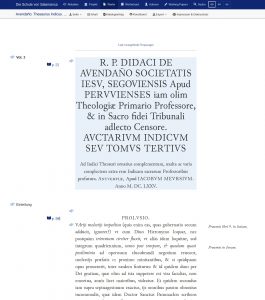In March and April, two new important sources of the Digital Collection of Sources of the School of Salamanca were published:
The Lexicon Iuris Civilis, written by Nebrija in 1506, has been edited according to the printed version of Frellaeus (Lyon, 1537). Part of a big encyclopaedical project undertook by Nebrija to offer the learned community of his time systematic vocabularies of disciplines such as medicine, natural history, theology and law, Nebrija’s Lexicon Iuris Civilis integrated 600 lemmata.
It reflects the intense and rich philological and juridical debates in which Nebrija intervened, correcting classical scholars of the Late Middle Ages (Accursius, Valla,…) and renovating their doctrines in a permanent dialogue with other great humanists of his time (Guillaume Budé, Andrea Alciato, Ulrich Zasius).
https://www.salamanca.school/en/workDetails.html?wid=W0078
 The edition of Diego de Avendaño’s Thesaurus Indicus is also progressing. After the publication of the first and second volume of the Thesaurus, devoted to the juridical and theological dilemmas which were raised by the secular (Vol. 1) and ecclesiastical (Vol. 2) regiments of Peru in the 16th and early 17th centuries, Volume 3 is now online. The recently edited volume is, in fact, the first book of an actualization of three parts written by a never satisfied Avendaño to correct and deepen the original Thesaurus Indicus. It was published seven years after the Thesaurus by the same editor (Antwerpen, Jacobus Meursius, 1675), under the name Auctarium Indicum. Together with many legal and moral matters, Avendaño examines in depth the different contemporary positions regarding the value of probable positions in juridical and theological argumentation. The influence of Jesuit co-religionaries such as Luis de Molina and Francisco Suárez is very significant in a treatise in which the writings of most of the European and American learned men of its time are thoroughly discussed.
The edition of Diego de Avendaño’s Thesaurus Indicus is also progressing. After the publication of the first and second volume of the Thesaurus, devoted to the juridical and theological dilemmas which were raised by the secular (Vol. 1) and ecclesiastical (Vol. 2) regiments of Peru in the 16th and early 17th centuries, Volume 3 is now online. The recently edited volume is, in fact, the first book of an actualization of three parts written by a never satisfied Avendaño to correct and deepen the original Thesaurus Indicus. It was published seven years after the Thesaurus by the same editor (Antwerpen, Jacobus Meursius, 1675), under the name Auctarium Indicum. Together with many legal and moral matters, Avendaño examines in depth the different contemporary positions regarding the value of probable positions in juridical and theological argumentation. The influence of Jesuit co-religionaries such as Luis de Molina and Francisco Suárez is very significant in a treatise in which the writings of most of the European and American learned men of its time are thoroughly discussed.
https://www.salamanca.school/en/workDetails.html?wid=W0001_Vol03